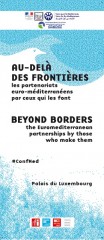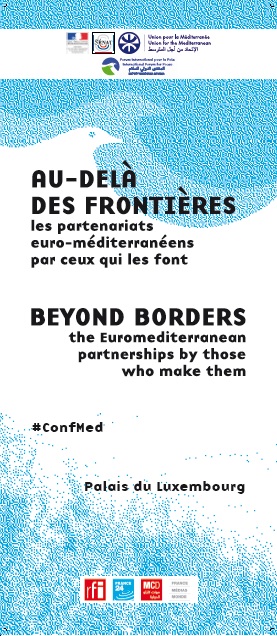Appel de Paris : Miguel Moratinos

The Call from Paris
On the 19th and 20th of June, the forum “Beyond Borders: Euro-Mediterranean partnerships by those who make them” was held at the Senate, Paris. Amongst its chief organisers was the Forum for Peace, in partnership with the Ministry of Foreign Affairs and the Union for the Mediterranean.
Aside from a plethora of topics covered during the conference, as well as the diverse and high calibre-level of its participants, its success must be further emphasised in light of the recent fluctuations in political climate both throughout Europe and the Near and Middle East regions. Indeed today, both shores of the Mediterranean are threatened by different but equally destructive forces of conservatism, both of which turn away from cooperation and unity. In Europe, we have seen a resurgence of conservative nationalist parties (evidenced by the recent European elections) that would see the curtailment of European society as a whole. The Near and Middle East has witnessed the building discontent of the Arab people, coming to fruition through the Arab spring: these demonstrations have served as a beacon of hope and democracy overall, but in some cases have resulted in a return to authoritarianism or allowing a window for extremist political parties to seize power.
Yet it was with this in mind that, from many countries throughout Europe and the Mediterranean, Ministers, ambassadors and politicians, leaders of civil society and private sector representatives, all convened in Paris to converse, learn and act: hear words from project directors from varying domains (economic, energy, environmental, cultural); listen to the difficulties some players currently face – the lack of not only a means to achieve their goals, but also an analysis of the current aid and its intended subjects; learn from the experience of some, and the innovation and imagination from others; and finally to take action and to ensure that, for tomorrow, thanks to new tools and targeted needs, a systematic and effective approach to build and strengthen Euro-Mediterranean cooperation exists.
The discussions, conclusive and successful, lead us to make a call to engage and develop critical Mediterranean projects: the very projects that French President François Hollande personally called for. Some of the projects presented at the conference function efficiently: we had, through different illustrations, the Women Business Forum in the form of the E-MedMed (highlihghting the use of a common history textbook), as well as the Family Forum and the work of Souk el Tayeb in Lebanon and Syria. Other projects merit support for a rapid implementation: Kidron Valley / Wadi El Naar AREAS, ERASMUS + and EuroMed Mobilities’ academic exchange programs and the Euro-Mediterranean University in Fez (UEFM). Many other projects struggle to gain financial support, which is the case for Red Sea-Dead Sea projects, actualising cooperation between Israelis and Palestinians through the implementation of water projects in Gaza. There were also various new initiatives announced at the forum, which are worthy of encouragement, with particular emphasis on the establishment of the Mediterranean Water Agency.
We invite all participants gathered at the conference of June 20 to reconvene in order to: work and cultivate the missing expertise; aid local projects to build and develop into other relevant areas; and transform bilateral initiatives into tripartite or multilateral initiatives.
The overall objective through these Mediterranean initiatives is both to provide support for existing projects in order to multiply their impact, to unite players with the view of expanding their areas of influence and create synergies that will bring to the fore the actors and the projects of tomorrow.
It is the fundamental challenge of federation of actors in the Mediterranean that we give form to: this is the objective of the Success For Med initiative that we plan to launch soon, in partnership with the Inter-Ministerial Delegation for the Mediterranean (dimed). It consists of a dossier of virtual media designed to bring together all project leaders onto a single platform in order to promote sharing and to collaborate easier.
Additionally, in order to continue the forward momentum ignited in Paris, we plan to organise a reconvention in Marseille before the end of the year, with the goal of reaching a broader spectrum of Mediterranean actors.
Lastly, we also wish to call on all participants of the meeting to cooperate for universal peace. Here, we do not want to consider peace as a means; it is not a question of what this concept can bring us if realised: it is to ask what we can do to achieve this stability. Therefore, we see peace, too, as itself a project. This is certainly the most difficult of all to implement, however the most beneficial. The much-anticipated success of this project will also enable others who are hindered and interrupted for political or geopolitical reasons.
In this majestic project, each of us is an actor of power. That is why we invite all stakeholders present at the June 20 meeting to return to Paris to facilitate the urgent implementation of the Arab Peace Initiative and will be the subject of a major conference in September in Paris.
Mediterranean citizens, beyond the projects and throughout the entirety of the Euro-Mediterranean region, strive towards a horizon of peace, security, justice and freedom; to give priority to women and guarantee all people of the region access to basic needs, both cultural and educational, but also to the knowledge of the Other, beyond the boundaries that separate us.



